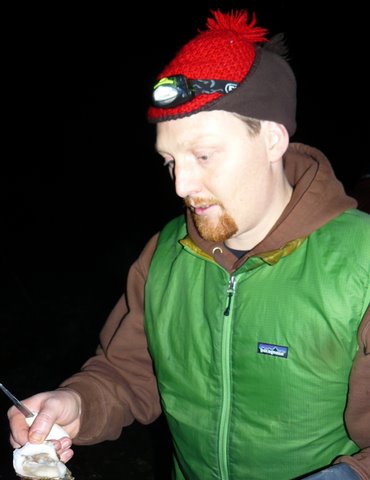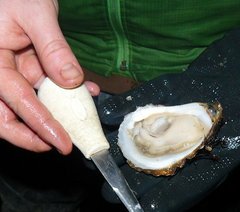It's normally a one-lane track from forest to shore along Totten Inlet, but under last night's full moon and extreme low tide, there's now a couple hundred yards between the treeline and the water's edge. Underfoot, it's all wet sand and oyster shells. Behind us, wearing LED headlamps, a work crew is picking oysters out of the ground, first into plastic buckets, then into 20-bushel wire cages. Totten Inlet Virginicas they are.
The time has come, said Cornichon,"Here, let me open a couple for you," says an oysterman who appears out of the blackness, one of a dozen Taylor Shellfish employees who've come out for this periodic moonlight picnic. He reaches down and plucks a couple of shells from the sand, trots down to water's edge to rinse them, and returns, shucker's knife in hand. Seconds later, we're slurping the Virginicas, firm and icy-cold, chased with a sip of Cedergreen sauvignon blanc. The oyster to end all oysters, the picnic to end all picnics, an event of pure perfection.
For bivalves on the beach:
The moon is full, the tide is out...
We'll have an oyster feast! (*)
Our helpful oysterman, it turns out, is Gifford Pinchot IV, known as Marco. Yes, that Gifford Pinchot, whose great-grandfather was Teddy Roosevelt's secretary of agriculture and founder of the US Forest Service, in whose honor the Columbia National Forest was renamed. Though he grew up in Connecticut, Marco came west, graduated from Evergreen and earned advanced degrees in ecology from Western and the Bainbridge Graduate Institute. If there were a poster child for environmental stewardship, it would be Marco.
(*) Apologies to Lewis Carroll, whose nonsense poem, The Walrus & The Carpenter, inspired Jon Rowley to create this event.



Leave a comment